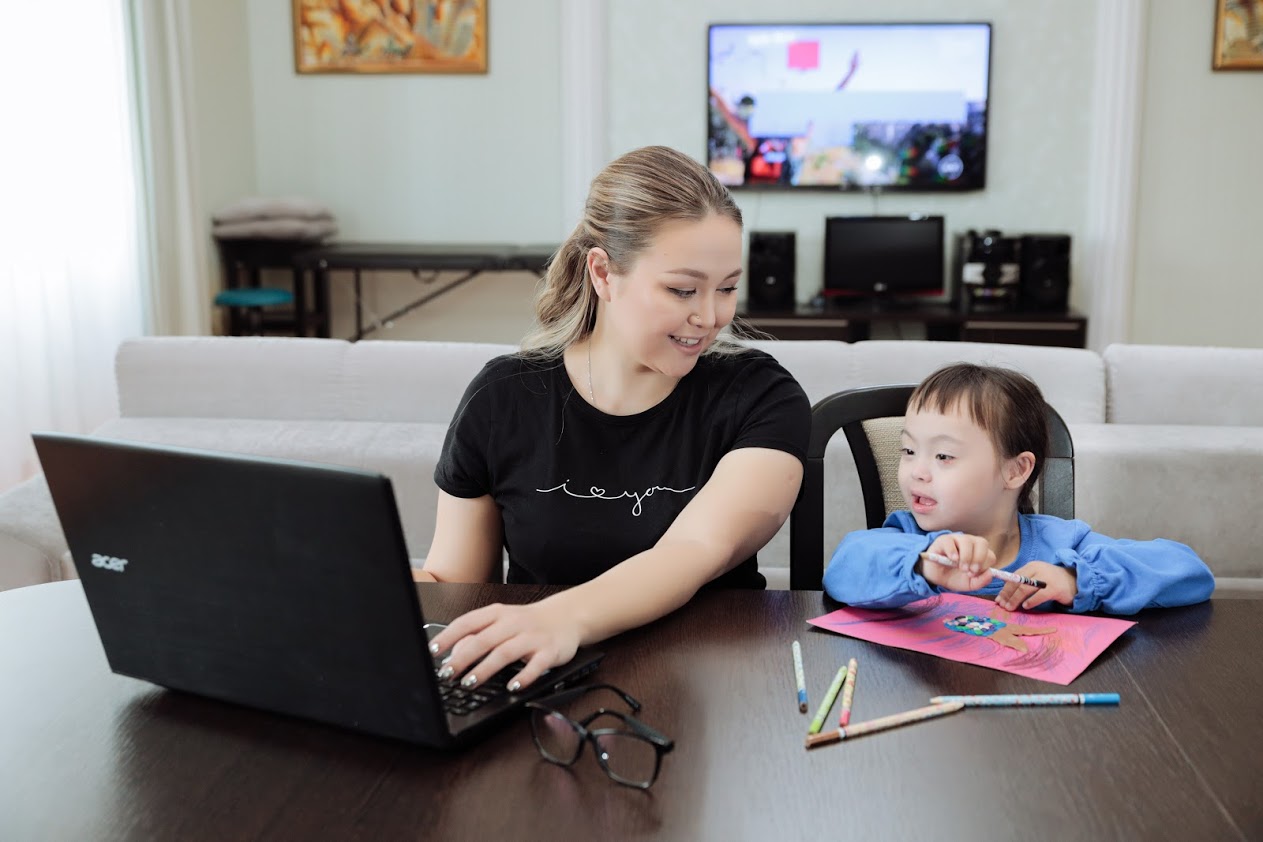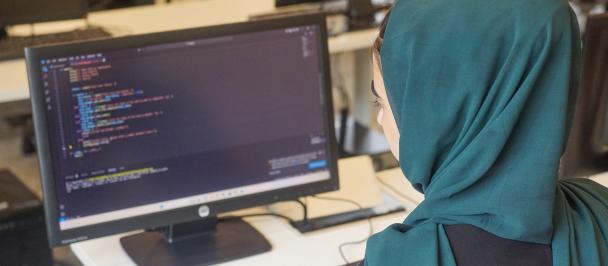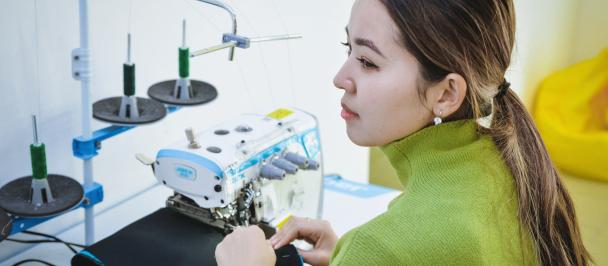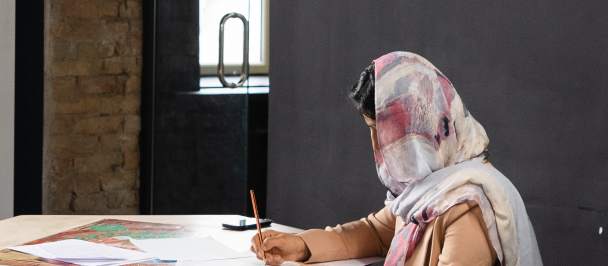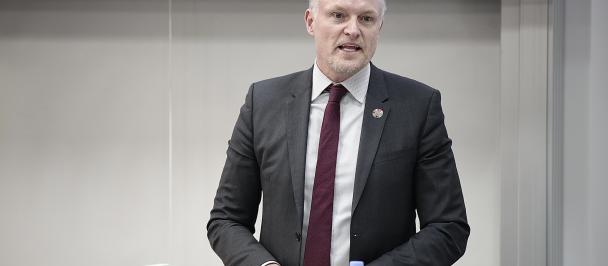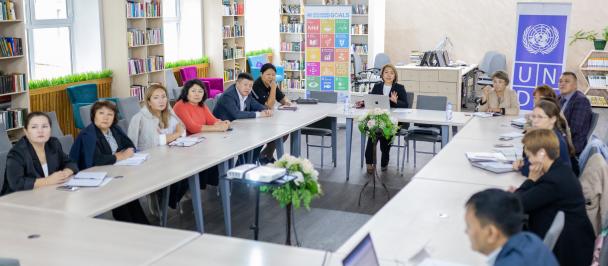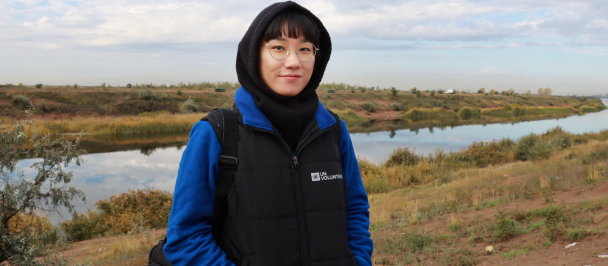Maryam Telegenova from Nur-Sultan has become a participant of UNDP’s subsidised apprenticeship programme, which offers professional training internships.
“As the mother of a special needs child, I really needed my job in the beauty salon to pay for the medical treatment for my daughter. But with Covid-19 and the ensuring lockdown, the beauty salon where I worked as a make-up artist closed down,” Maryam Telegenova from Nur-Sultan city says.
Maryam was one of many people in the service sector who lost their source of income during the pandemic. Workers in this sector were among the worst-hit. Maryam had to look for a new job. Through other mothers like herself, Maryam learned about UNDP’s subsidised apprenticeship programme, which offers professional training internships.
Within the internship programme, Maryam took Social Media Marketing courses online. She improved her computer skills and learned to create and edit content, such as various texts and videos. It was an opportunity both to provide for her family during a crisis and to acquire a new profession. “Previously I used to interact with people all the time so it’s hard to get used to working remotely. But the internship changed my lifestyle. It opened up an online world, where I work and communicate with people,” she says.
A total of 150 unemployed young people in the cities of Nur-Sultan, Almaty and in the Karaganda region participated in the apprenticeship programme. Altogether 84 interns were women. The high number is because women have been disproportionally affected by the pandemic in Kazakhstan. They comprise the majority of the workforce in the industries, most hit by the lockdown such as recreation, tourism, education, beauty and retail.
The participants took up apprenticeships in private companies, NGOs and government agencies.
The internship has provided young people with an opportunity to obtain new skills and receive a ₸60,000 monthly allowance. For three months the apprentices are hired on a trial basis and if satisfied with their performance, employers offer them a longer-term job.
Maryam Telegenova was among the 65 percent of interns who successfully got hired after completing the internship. Maryam now works for the NGO "Mama PRO" that supports the professional growth of socially vulnerable women. Maryam helps other mothers with special needs children to learn new skills.
“During this crisis many women became disoriented and were at a loss. Our online courses both benefit and are convenient for mothers who cannot go to work daily and prefer working remotely. We have already trained several Social Media Marketing specialists,” says Maryam.
The internship also encouraged young people to become entrepreneurs. Thanks to new skills and knowledge acquired during the internship, about 20 percent of interns found additional funding sources for the implementation of their ideas and initiatives. “Some young people created their own social projects, won small grants, launched start-ups and opened businesses, ” says Makhabbat Espenova, Executive Director of the local NGO, "Kameda."
Pavel Utkin took up an apprenticeship at the Community-Plus Public Foundation in Almaty. The mentorship helped him to launch social projects on supporting Kazakh language teachers. “I learned to better organize my working time, optimize processes and acquired skills for arranging online events, courses and trainings, which helped me a lot in managing my social projects,” he says.
The apprentices also had sessions with mentors on goal setting, time-management, teamwork and business development skills. Altogether the project involved 25 mentors who were specially trained for working with vulnerable youth. They regularly conducted group and individual meetings with the apprentices.
Zhanat Nurgaliev mentored five apprentices. In his opinion, mentors should be able to work with a diverse range of young people, understand them and transfer knowledge and skills. “The apprenticeship helped most of the young people to understand what they want to do in life – some of them want to work in NGOs, others launched start-ups or social projects”, he says.
Earlier, the apprenticeship programme was successfully tested in the framework of the UNDP regional project aimed at preventing violent extremism in Central Asian countries. Since September 2019, about 500 young people who took up an apprenticeship in remote areas of Aktobe and Karaganda regions. More than half continued to work in the organizations they were assigned to during their internship.
In March 2020, as the COVID-19 pandemic unfolded, the internship programme was expanded and transformed into a comprehensive toolkit for employment and psychosocial support, mentoring and career guidance for vulnerable youth affected by the crisis. Maryam notes, “My life changed after the internship – It not only helped me provide for my family, but also broadened by professional horizon”.

 Locations
Locations